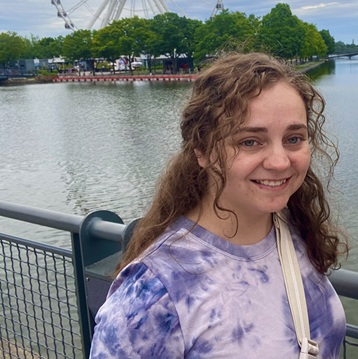Solving a Decades-long Solar Flare Mystery
- Details
- Published: Wednesday, September 03 2025 01:40
For almost half a century, scientists have been scratching their heads over one of the strangest and most inexplicable phenomena to occur on the sun. During certain explosive events like solar flares, helium-3 (an extremely rare isotope normally found in tiny quantities) suddenly becomes dramatically more abundant than usual as it gets blasted toward Earth. Sometimes, it even outnumbers helium-4, the most common variant of the element—a complete reversal of expectations.
Now, Anna Fitzmaurice, a physics Ph.D. student at the University of Maryland, may have brought scientists a step closer to solving this cosmic puzzle. Working with Distinguished University Professor of Physics James Drake, Fitzmaurice narrowed down potential culprits for the abnormally high amount of helium-3 during solar flares by focusing on a fundamental process called magnetic reconnection.  Anna Fitzmaurice
Anna Fitzmaurice
“Magnetic reconnection is a driving force behind solar flares and their interactions with Earth's magnetic field, such as what we see as the northern and southern lights,” Fitzmaurice explained. “Although the sun’s magnetic reconnection and the helium being released toward Earth usually isn’t harmful to us, it influences space weather and potentially impacts our satellites, power grids and even astronauts we send up to space. Studying this phenomenon can help us predict and maybe even prepare for when things get rough.”
A new approach to an old problem
Previous scientific theories focused on high-energy electrons (negatively charged particles) somehow creating the right conditions to accelerate helium-3. But based on previous magnetic reconnection research, Drake’s group thought that the real drivers might be just the opposite: they believed that protons (positively charged particles) were more likely to be able to transfer energy into helium-3, superheating the rare isotope and pushing it past helium-4 toward Earth.
To test this theory, Fitzmaurice developed a detailed simulation of solar environments by modeling a uniform magnetic field containing cold background protons and hot, energetic particles streaming through them like jets.
“Imagine if you had a pond full of water. If you shoot a hose through this pond, you’d get all these ripples and waves in the water,” Fitzmaurice explained. “Something similar happens when you shoot high-energy protons through a background of still, non-moving protons.”  3He acceleration. Credit: Anna Fitzmaurice.
3He acceleration. Credit: Anna Fitzmaurice.
Fitzmaurice found that magnetic reconnection on the sun created beams of fast-moving particles, and these particles generated two types of plasma waves that heated helium-3 to extremely high temperatures—nearly 20 times hotter than its original temperature. The temperatures were so intense that superheated helium-3 could move into regions of the sun where particles get accelerated and eventually shot toward Earth. However, helium-4 experienced less heating, so it stayed behind this speed threshold and was unable to reach the acceleration zones. Fitzmaurice’s research resulted in two recent papers, one published in The Astrophysical Journal and the other in the journal Physics of Plasmas.
“My simulations indicate that helium-3 enhancement events are probably much more common than we previously thought,” Fitzmaurice said. “This suggests that there’s some underlying physical process that’s a fundamental feature of solar flare physics rather than a rare anomaly. Learning more about these fundamental processes can help us better understand how the universe works. We can apply this to many different contexts, including learning about environments around black holes and neutron stars, or how the sun’s activity influences life on Earth and humans.”
From family stargazer to solar flare detective
Fitzmaurice feels like she’s come a long way in her journey as an astrophysicist. Growing up in a family where “no one was very science-minded,” she often reflects on how her serendipitous path to astrophysics began—with her father, who often took her to watch rocket launches from NASA’s Wallops Visitor Center in Virginia when she was growing up.
“I feel pretty lucky to have someone who really fed my curiosity about space as a kid,” Fitzmaurice explained. “We would go as a family to watch meteor showers and rocket launches. He pointed out stars and planets in the night sky. It was because of those experiences that I ‘accidentally’ ended up studying the sun during my undergrad at Catholic University, even though it really wasn’t my original plan in college.”
Looking back, Fitzmaurice believes she couldn’t have picked a better time to study the sun and its fiery storms. She initially began her research around the 2017 total solar eclipse, which captured the attention of millions of Americans, and has observed many unique solar events since. Now in her final year of her Ph.D. program, Fitzmaurice hopes to connect her theoretical breakthrough about helium-3 to real satellite measurements and essentially prove that her computer models match what actually happens deep in space. She hopes her work will help scientists understand the fundamental physics behind solar flares and bring researchers closer to predicting when and how violently the sun might act up.
“It’s honestly been a very exciting time for me and other solar scientists,” Fitzmaurice said. “We’re now nearing the end of the solar maximum, the peak of the sun’s 11-year activity cycle and when there are more frequent and violent solar flares. With satellites like the Parker Solar Probe and Solar Orbiter, we’re getting closer to the sun than ever before and learning things we would never have expected.”


